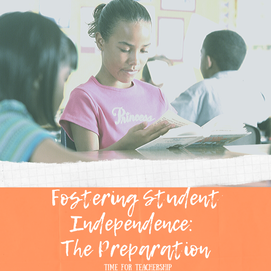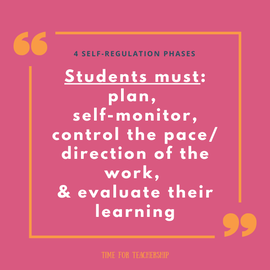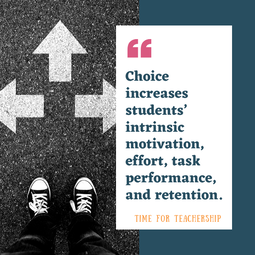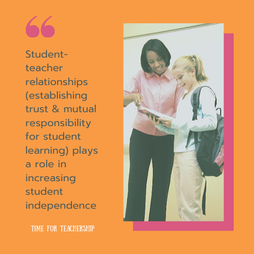|
Wouldn’t it be great if you had more time to meet with students 1:1 or in small groups? What if kids were more focused and excited about learning? What if students could lead conferences about their academic progress, not just sharing whether they behave or try hard, but really speak to the ways they learn best and their progress on each standard? It’s totally do-able. Fostering student independence is at the heart of all of these outcomes. What do you mean by student independence? Meyer et. al. note “the key ingredient in independent learning is the shift of responsibility for the learning process from the teacher to the student.” To do this, students need to understand how they learn, find motivation to learn, and collaborate with teachers to structure their learning environment. They discuss 4 phases of self-regulation which enable independent learning, so students must: plan, self-monitor, control the pace & direction of the work, and evaluate their learning (Meyer, Haywood, Sachdev, & Faraday, 2008). Why else should we foster student independence? Research has found student independence resulted in: improved academic performance; increased motivation and confidence; and greater student awareness of their limitations and their ability to manage them (Meyer et al., 2008). Student independence is also the first attribute of a portrait of a student who demonstrates “College and Career Readiness” (Common Core). The job market is shifting from what it was a decade ago. It is estimated that by 2020, 50% of workers will be independent contractors, and 85% of jobs that will exist in 2030 don’t exist yet ("The next era of human machine partnerships"). Students will need to be able to learn content and job-specific skills that we can’t teach them now because we don’t know what jobs they will be doing. We can, however, prepare them to be excellent independent learners. Then, they can learn anything they’ll need to know! Sounds great. How can I foster student independence? As students will go through different phases of self-regulation, teachers can do different things to support students depending on what phase of the learning process they are in. This post focuses on what to do before a learning activity. Next week, I'll share another post focused on support student independence during and after a learning activity. Before a learning activity, teachers can: Clarify the end goal for students. Answer the question: What’s the purpose of this class? (Don't let the answer be just “to get to the next grade level”.) What skills are students learning that will serve them throughout their lifelong educational journeys? I talk more about teaching standards and share free rubric rubric templates for skills-based grading in an earlier post. Prepare differentiated learning experiences. Each student should be able to experience success and an appropriate challenge. This takes some resource gathering, but the lesson activity itself can remain the same for all lessons. Choose a protocol that works for you and your students and re-use it as you teach and learn new content. (Some of my favorites: jigsaw or workshop (for differentiated groups) and What I Need a.k.a. “WIN” Time (for independent work). Want to see it in action? Watch this video from BetterLesson, highlighting the latter strategy inside “Master Teacher,” Daniel Guerrero’s classroom. Offer student choice. Provide opportunities for students to determine how they want to learn new information, what they want to learn (have students set a goal!), or how they will demonstrate their learning once they’ve achieved mastery. Choice increases students’ intrinsic motivation, effort, task performance, and retention. If students do not find the information interesting or important, their working memories will not process it and they won’t remember it (Marzano, Pickering, & Heflebower, 2010). The more we can offer choice to students in choosing the learning experience that's most interesting to them, the more they will learn! Build relationships with students. This may sound strange in this list, but research has found student-teacher relationships (specifically, the establishment of trust & mutual responsibility for student learning) plays a role in increasing student independence (Meyer et al., 2008). Marzano, Pickering & Heflebower agree relationships are important. They note, “the most general influence on a student’s emotional engagement is a teacher’s positive demeanor,” meaning their enthusiasm for learning as well as their ability to help students feel, “welcomed, accepted, and supported,” (2010). Planning for instruction is obviously a huge part of what we already do as teachers, but keeping the student independence goal in mind as we plan can help us make important decisions that deeply impact student learning in the long run. Start by trying just one tip. Remember, helping students become independent learners can address a lot of other struggles (e.g., off-task behavior, lack of motivation, students’ low academic performance). I’d love to hear how you plan for student independence! Share in the comments, in our facebook group, or tag me on your preferred social media platform.
1 Comment
|
Details
For transcripts of episodes (and the option to search for terms in transcripts), click here!
Time for Teachership is now a proud member of the...AuthorLindsay Lyons (she/her) is an educational justice coach who works with teachers and school leaders to inspire educational innovation for racial and gender justice, design curricula grounded in student voice, and build capacity for shared leadership. Lindsay taught in NYC public schools, holds a PhD in Leadership and Change, and is the founder of the educational blog and podcast, Time for Teachership. Archives
May 2024
Categories |





 RSS Feed
RSS Feed